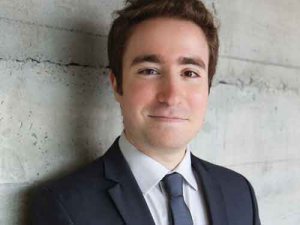“I have always wanted to work in an industry that is keen on using science to strive ahead, to fix its problems and beat its challenges.”
Kinzurik has no hesitation in stating the above as his reasons for applying for the job at NZW. The former Argentinian who studied in his home country, Houston -Texas and New Zealand says it is a rare thing for any industry to have a wide vision of using science to move forward on a wholesale scale. But NZW does just that.
With science in his blood, (both his parents are chemists) Kinzurik decided to take a step sideways and concentrate on molecular biology and biotechnology. His early goals were quite simple.
“I wanted to be a millionaire by the time I was 25,” he jokes. “I wanted to invent this revolutionary biotech idea that was going to fix everything, create world peace and all that. Well that was my vision at the time, at least.”
He did however help create a start-up idea, that unfortunately didn’t quite enthuse potential investors as much as it enthused himself.
“My friend and I had this idea that we were going to make biofuel by using a local species of microalgae. It was a great idea and everyone loved it, except the year we put this into action was 2007 – the year of the crash. When we were coming up with the idea, the cost of a barrel of oil was $140. By the time we finished putting together the idea, it had collapsed to almost $35. There was no way it was going to make it then.”
He therefore decided that maybe he should concentrate on his scientific career before he started hitting up investors with new ideas again.
So he headed to Houston to do his Masters in yeast genetics.
“I saw it as a really wide opportunity. There is so much you can do by manipulating yeast genetics. Wine is one of them. My main drive was to use yeast genetics to create value in something that was already valuable. And wine is a valuable and established product.”
With his Masters under his belt, he was keen to go further scientifically, and ended up in New Zealand to undertake a PhD at University of Auckland, under the now retired, Prof. Richard Gardner, and Dr. Bruno Fedrizzi.
“I had the really great fortune to be Richard’s last PhD student. He is a great mentor for me and while he retired around halfway through my PhD, those 18 months I worked with him made a huge difference.”
His first year in New Zealand was 2014, now three years later he is heading the NZW Research Programme – his dream job. Having always been on the other side of the scientific equation – undertaking the research – he is now able to see the practical results of that sort of work.
“When you are working on your bench, pushing for hours trying to get a result, you never see the big picture. How will this affect the winemaker or viticulturist? However, this job shows you the big picture,” Kinzurik says, “because you are working with the research programmes and passing that information on.”
One of his drivers to apply for the job was NZW’s mission statement he says, which is to create value for their members.
“That is exactly what in my view, science should be used for. You want to create value for people and I am really excited that this company has that as its mission. If you make less than one percent of the world’s wine, you have to differentiate yourself from others. That differentiation has to come from quality – using science to create quality is a very smart idea.”
But perhaps what has impressed him the most, is the world-class research that is being led by NZW. Particularly when you take into account how small New Zealand is.
“There is no one in the world doing the kind of programmes that we are doing. If you go to wine conferences and talk to people in Europe and the US you soon learn that no one has an industry wide approach to research like New Zealand does. That is extremely impressive.”



